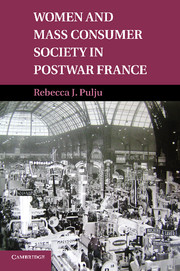Book contents
- Frontmatter
- Contents
- List of Figures and Tables
- Acknowledgments
- Abbreviations
- Introduction
- 1 Consumers for the Nation
- 2 The Productivity Drive in the Home and Gaining Comfort on Credit
- 3 For Better and For Worse
- 4 “Can a Man with a Refrigerator Make a Revolution?”
- 5 The Salon des arts ménagers
- Epilogue
- Bibliography
- Index
4 - “Can a Man with a Refrigerator Make a Revolution?”
Redefining Class in the Postwar Years
Published online by Cambridge University Press: 01 March 2011
- Frontmatter
- Contents
- List of Figures and Tables
- Acknowledgments
- Abbreviations
- Introduction
- 1 Consumers for the Nation
- 2 The Productivity Drive in the Home and Gaining Comfort on Credit
- 3 For Better and For Worse
- 4 “Can a Man with a Refrigerator Make a Revolution?”
- 5 The Salon des arts ménagers
- Epilogue
- Bibliography
- Index
Summary
In March 1957, as the Salon des arts ménagers hosted its annual exhibition of home appliances, domestic arts, and national reconstruction plans, the journal L'Express gathered four scholars and intellectuals to discuss the future of France in light of the great demand for consumer durables. With all of the needs facing France, the L'Express host wondered, was it really healthy to turn production toward home appliances? Was perhaps a bit of “austerity” preferable? And what did this mean for working-class demands, he wondered, asking, “can a man with a refrigerator make a revolution?” The possible effects of mass consumption, credit, and comfort on the French class system were open to debate in the 1950s and 1960s. During the interwar period, economic conditions in France had made household technology and home modernization virtually unattainable for working-class families, and this had enabled socialists and intellectuals to insist that needs were class based: a worker with the same amount of money as a member of the bourgeoisie would spend it in different ways. Both socialists and elite intellectuals clung to this belief, as discarding it would entail modifying their notions of bourgeois taste or working-class radicalism.
- Type
- Chapter
- Information
- Women and Mass Consumer Society in Postwar France , pp. 143 - 179Publisher: Cambridge University PressPrint publication year: 2011

